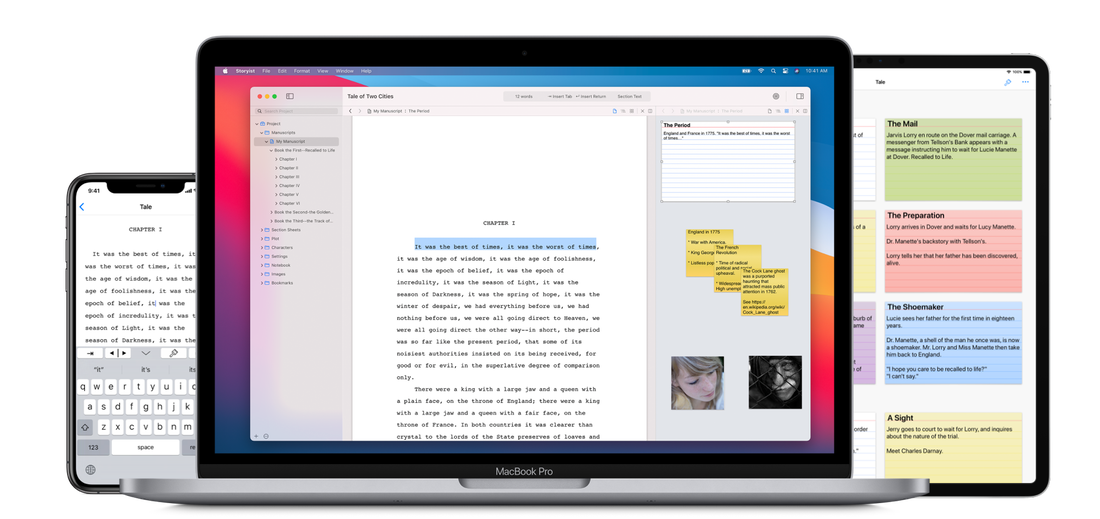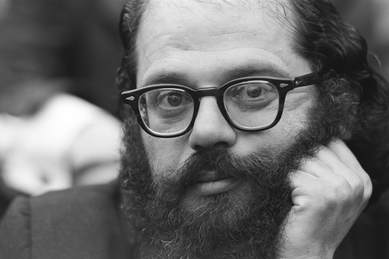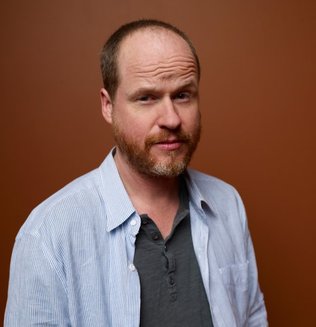|
Storyist is a powerful writing app that is designed to help writers of all skill levels create compelling stories. Whether you're a novelist, screenwriter, or journalist, Storyist has everything you need to take your writing to the next level. "Storyist is a great app for writers. I use it to organize my notes, research and manuscript. It's a great tool for keeping track of a complex story," One of the most notable features of Storyist is its intuitive interface, which makes it easy to organize your writing, track your progress, and access all of your research and notes in one place. With Storyist, you can easily switch between different views, such as manuscript, corkboard, and outline, to suit your writing style and needs. Another great feature of Storyist is its built-in research and note-taking tools. With the ability to easily add and organize research materials, such as images, documents, and web pages, Storyist makes it easy to keep all of your research and notes in one place, so you can easily reference them as you write. "Storyist is one of my favorite writing tools. It's great for keeping all of my notes and research in one place, and the outlining tools are second to none." - Brandon Sanderson Overall, Storyist is an excellent writing app that is packed with features to help writers of all skill levels create compelling stories. With its intuitive interface, built-in research and note-taking tools, and the support of a community of successful writers, Storyist is an essential tool for any writer looking to take their craft to the next level.
0 Comments
If you've ever had writer's block, you know that it can feel like the worst thing on earth. Even if you're a professional writer who does this for a living, the feeling of being stuck and unable to break through can be debilitating. And while there are many ways to overcome writer's block and get your creative juices flowing again (and even some helpful tips and tricks), sometimes writing isn't enough. You need more than just words on paper—you need inspiration! Luckily, there are plenty of books out there with tips on how best to beat writer's block. Here are my top 5 at the moment:
#1 - The Blank Screen by William Gallagher If you’re struggling to get started, feeling lost and fed up with life’s everyday stressors – then this is the book for you. Writer William Gallagher shows how to turn back the clock on all those little things which take away from your writing and make your Blank Screen the most productive place in the whole world. Turn emails back into useful tools, use your phone to stay in touch with distant friends and relatives and actually enjoy making phone calls again. Get more out of writing by getting rid of distractions such as deadlines, skype calls or taking short breaks. Maximize your time by learning how to work better in bursts, avoid procrastination and get rid of general writer’s block for good! This is a must-read for the modern writer, whether you wish to become a master of your pen and paper or just want to be able to work with friends, family and colleagues at home. William explains why distractions are not what they seem and how you can use them to shape and improve your writing; why time is limited, so make the most of it; how technology can help save you hours; strategies for coping with mental distractions (email); how the ancient art of messengering has been corrupted into mindless standard operating procedure; how Good Luck's always lurking around the corner. Frankly, William Gallagher is just a bit of a nutter. But that’s why I like him and this book. He talks about writing every day as an activity that creates content, not just words … He explores all aspects of out-of-the-blue creativity — great ideas, how to make them happen and when your brain should shut off from interruptions. This book covers how to take control of your writing life and get rid of the distraction and procrastination. Find out when you work best – and when you really don’t – plus how to remove most distractions and minimize all of them. Guess I could have just told you that... #2 - The Writer's Block: 786 Ideas to Jump-Start Your Imagination By Jason Rekulak Featuring more than 200 photographs throughout, this chunky little book covers every aspect of getting started with your writing. Whatever your genre, whether short stories, novels, or screenplays -- from the sun-drenched streets of New York to the elusive redwoods of Northern California, from modern day adventures in Tibet and Nepal to ancient Egypt and outer space -- you'll find the perfect exercise or idea for reaching your true potential as a writer. Turn any page to find your next idea or exercise that will jump-start your imagination! #3 - Around the Writer's Block: Using Brain Science to Solve Writer's Resistance By Rosanne Bane There are dozens of reasons why you might find yourself stuck in a place called writer’s block, and most of them have nothing to do with laziness or lack of ambition. In Around the Writer’s Block, best-selling author Rosanne Bane uses the most recent breakthroughs in brain science to help us understand, in simple, clear language, where writing resistance comes from: A fight-or-flight response hard-wired into our brain, which can make us desperate to flee the sources of our anxieties by any means possible. Part one gives you practical strategies for managing writer’s block; part two teaches you how to turn writing from a source of stress and anxiety into one of joy and personal growth; and part three shows you how to rewire your brain for consistent productivity. #4 - The War of Art: Break Through the Blocks and Win Your Inner Creative Battles By Steven Pressfield The War of Art is a no-nonsense, personal, and utterly powerful guide to conquering your inner saboteur and reaching the highest level of creative discipline. Acclaimed novelist Steven Pressfield lays out a battle-plan for overcoming artistic block, and shows how to reach the highest level of creative discipline. What keeps so many of us from doing what we long to do? Why is there a naysayer within? How can we avoid the roadblocks of any creative endeavor—be it starting up a dream business venture, writing a novel, or painting a masterpiece? This is one of the most important books for creatives of all stripes. It teaches about our own inner critic who says that we aren’t good enough. #5 - How to Write a Book: An 11-Step Process to Build Habits, Stop Procrastinating, Fuel Self-Motivation, Quiet Your Inner Critic, Bust Through Writer's Block, & Let Your Creative Juices Flow By David Kadavy Don't let writer's block stop you from writing a book. The steps to creating your own bestselling non-fiction book will help you lose that feeling of insecurity and gain a solid understanding of how to write a book in a way that actually works. This is a short book (around 7,000 words - almost half of them in its title), but powerful nonetheless. “Screenplays are structure, and that’s all they are. The quality of writing—which is crucial in almost every other form of literature—is not what makes a screenplay work. Structure isn’t anything else but telling the story, starting as late as possible, starting each scene as late as possible. You don’t want to begin with ‘Once upon a time,’ because There is an enormous difference between structure and formula. Often, those who are critical of structure have mistaken one for another. Structure is a vital element of all great screenplays. There are many different variations of structure. Your job as the screenwriter is to utilize the structure that is most appropriate for the story you’re telling.
“To gain your own voice, you have to forget about having it heard.” Quit worrying about who will read your screenplay, what genre is selling right now, or what you’ll do after winning your first Oscar. None of that matters. What is most important right now is telling your story. Your story. The one from your heart, soul, and your experience. The other will take care of itself if you’ve done your homework and are extremely lucky. The best thing you can do for your career is to write a screenplay that can’t be put down. -Stu Expose Yourself!“Always be yourself…unless you suck.” Your screenplay will reveal a bit about you as a person. It can’t be helped. The way you phrase things, the way you describe the world of your story, etc. Don’t be afraid to let yourself shine and enter into your writing. Write about what you love and it will read as such.
Your passion will be contagious to the reader and will augment their experience. Don’t hesitate to show people who you are (through your writing) and what you stand for. Write with confidence and command. You’re story and screenplay can only benefit from you. -Stu |
Writer of screenplays, fiction novels, inspirational stories, and short stories. Archives
April 2024
Categories
All
|





 RSS Feed
RSS Feed